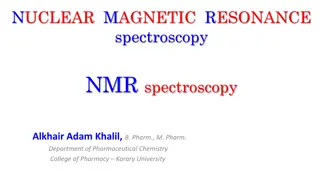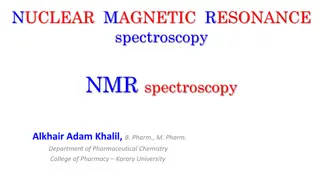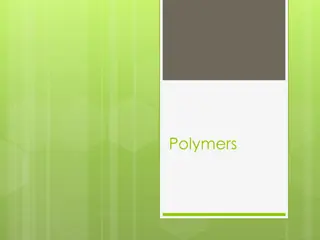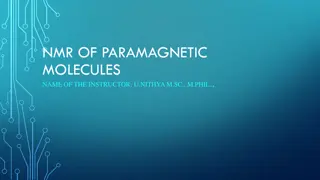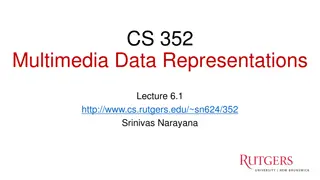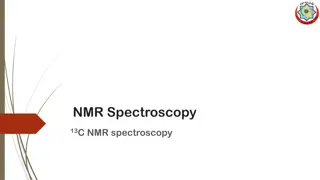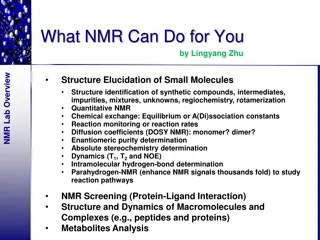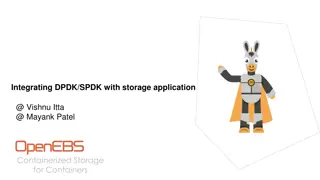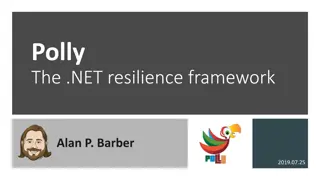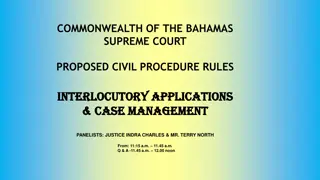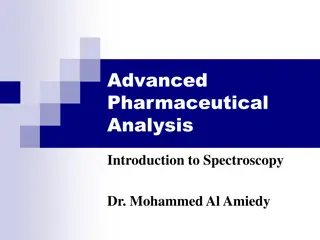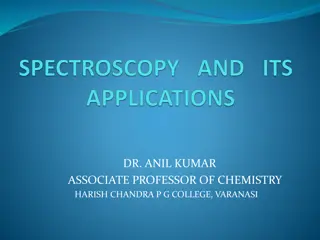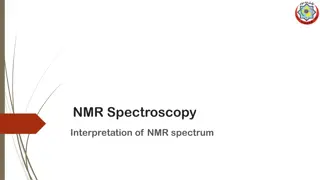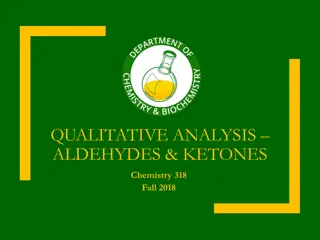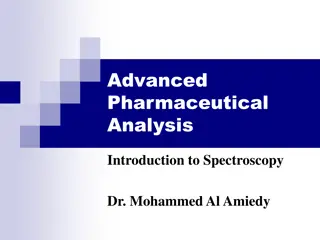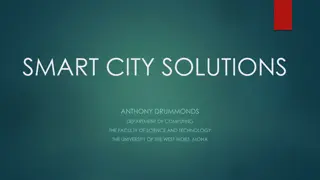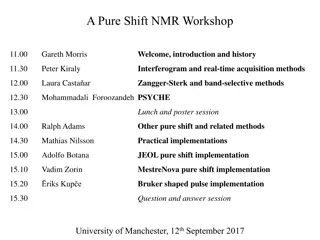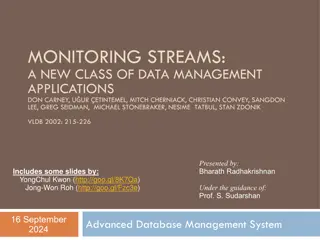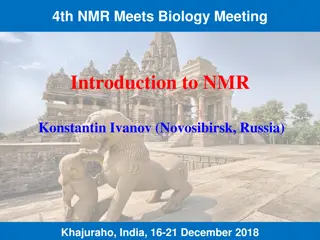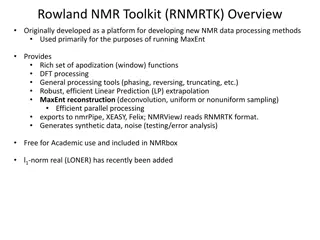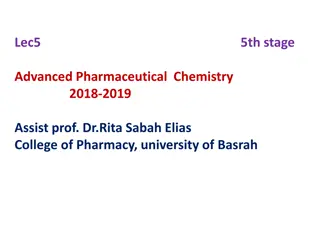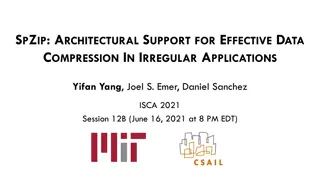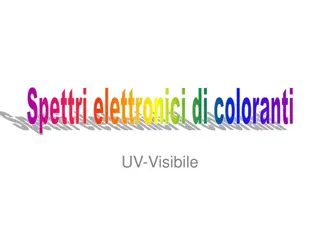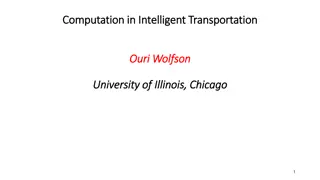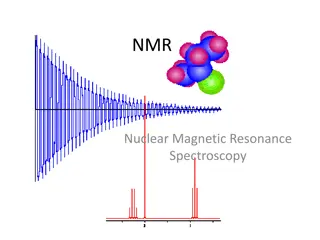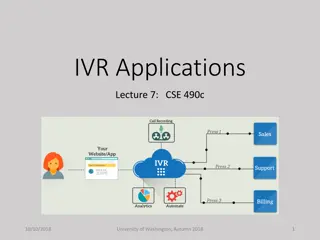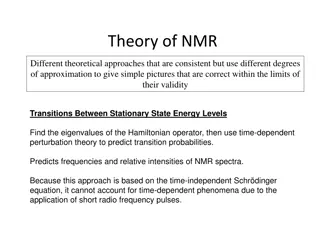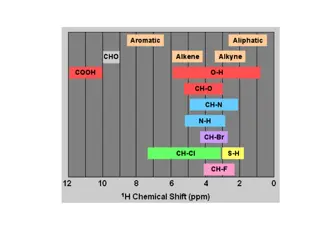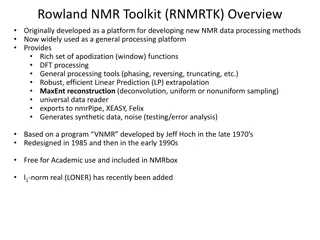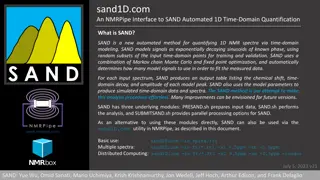Applications of Heat Exchangers in Various Industries
This topic delves into the diverse applications of heat exchangers in different industries and plants, elucidating the use of various types of heat exchange systems and their importance in processes like bio-processing, power generation, and more. The lecture covers heat exchange applications for li
0 views • 24 slides
Enable 2022: The Localization Tool for PowerBuilder Applications
Enable 2022 offers a comprehensive solution for making PowerBuilder applications multilingual, revolutionizing the way applications are localized. With advanced features like dynamic language switching and support for all languages, Enable Development is a leader in PowerBuilder outsourcing and mana
2 views • 11 slides
Introduction to NMR Spectroscopy: A Powerful Tool for Structural Analysis
Nuclear Magnetic Resonance (NMR) spectroscopy is a vital technique in determining the structure of organic molecules. It complements IR and UV spectroscopies by providing a detailed map of the carbon-hydrogen framework. Understanding the physics behind NMR, such as nuclear spin and the effect of mag
6 views • 30 slides
Understanding NMR Spectroscopy for Structure Identification
NMR spectroscopy is a powerful tool in determining the structure of organic compounds. This summary outlines the process of using 1H NMR spectroscopy to identify an unknown compound, detailing steps such as determining different proton types, analyzing integration data, and interpreting splitting pa
3 views • 40 slides
Konw about our team
Know About Our Team:\nMr.Bageerathan\nMr. Bageerathan is a distinguished legal professional with a rich background spanning over 16 years in the legal field. He earned his Law degree from University Law College and further enhanced his legal acumen by obtaining Dual Masters degrees in Law (LL.M) fro
0 views • 4 slides
Pascal's Rule in NMR Spectroscopy ( n+1 )
Pascal's Rule in NMR spectroscopy, also known as the (N+1) rule, is an empirical rule used to predict the multiplicity and splitting pattern of peaks in 1H and 13C NMR spectra. It states that if a nucleus is coupled to N number of equivalent nuclei, the multiplicity of the peak is N+1. The rule help
1 views • 30 slides
Understanding Polymers and Their Properties
Polymers are long chains of repeating monomers, with both natural and synthetic varieties. Natural polymers include silk, cellulose, and DNA, while synthetic ones encompass plastics, fibers, and elastomers. The properties of polymers, such as molar mass and monomer structure, determine their functio
0 views • 15 slides
Understanding NMR Spectroscopy of Paramagnetic Molecules
NMR spectroscopy of paramagnetic molecules is influenced by the presence of unpaired electrons, leading to broadened spectra and complex coupling mechanisms. Quadrupolar nuclei, with spins greater than 1/2, play a significant role in the relaxation and splitting of NMR signals. The interaction betwe
0 views • 19 slides
Understanding Multimedia Data Representations and Applications
Multimedia data representations play a crucial role in various applications on the Internet, especially those involving audio and video content. This lecture explores the differences between traditional delay-tolerant applications and real-time multimedia applications, emphasizing the importance of
3 views • 24 slides
Understanding the Basics of 13C NMR Spectroscopy
Nuclear Magnetic Resonance (NMR) Spectroscopy is a powerful analytical tool used in chemistry to study the structure of molecules. This summary focuses on the application of 13C NMR spectroscopy, which provides valuable information about carbon atoms in a compound. The low natural abundance of carbo
0 views • 36 slides
NMR Applications in Organic Chemistry Research
NMR (Nuclear Magnetic Resonance) is a powerful technique used in organic chemistry research for a wide range of applications, including structure elucidation, identification of small molecules, quantitative analysis, and studying dynamics. Through various NMR experiments, researchers can determine s
1 views • 13 slides
Integrating DPDK/SPDK with Storage Applications for Improved Performance
This presentation discusses the challenges faced by legacy storage applications and proposes solutions through the integration of DPDK/SPDK libraries. Topics covered include the current state of legacy applications, issues such as heavy system calls and memory allocations, possible solutions like lo
2 views • 17 slides
Understanding Polly: A Resilience Framework for .NET Applications
A detailed overview of Polly, a resilience framework for .NET applications designed to help applications recover from failures and outages in external infrastructure. The framework provides building blocks like fluent API, retry strategies, timeouts, and code samples to ensure applications can grace
0 views • 20 slides
Bahamian Supreme Court Proposed Civil Procedure Rules on Interlocutory Applications
The Commonwealth of The Bahamas Supreme Court has proposed rules regarding interlocutory applications, which involve applications for court orders made at various stages of legal proceedings. These rules outline the process for making such applications, including the grounds required, drafting of or
3 views • 22 slides
Understanding NMR Spectroscopy in Pharmaceutical Analysis
Introduction to acquiring a 1H NMR spectrum in pharmaceutical analysis, including the role of magnetic fields, use of superconducting materials, and the principles behind NMR spectrometers.
0 views • 22 slides
Structural Elucidation of Chemical Compounds Using Spectroscopy Techniques
This presentation discusses the various types of spectroscopy techniques such as UV-Visible, IR, Raman, NMR, and others used for elucidating the structure of chemical compounds. It covers the identification of molecule shapes like AB2, AB3, and AB4, with a focus on linear and non-linear structures.
0 views • 18 slides
Understanding NMR Spectroscopy and Chemical Shifts
Nuclear Magnetic Resonance (NMR) spectroscopy is a powerful technique for analyzing molecular structures based on the chemical shifts of protons. In an NMR spectrum, peaks correspond to different protons in a compound, with their positions, intensities, and spin-spin splitting providing valuable inf
0 views • 19 slides
Understanding Interlocutory Applications in Court Proceedings
Interlocutory applications are crucial in ongoing court cases, allowing parties to seek remedies, temporary reliefs, or address defects in the suit. These applications can be made in open court or to a judge in chambers through motions. Ex parte applications, made without notifying the opposing part
2 views • 65 slides
Qualitative Analysis of Aldehydes and Ketones in Chemistry Lab
In this Chemistry 318 lab, students will conduct qualitative analysis of aldehydes and ketones using chemical and spectroscopic methods. The lab includes classification tests, spectroscopy (IR, 1H-NMR/13C-NMR, MS), and identification of unknown compounds. Experimental procedures involve physical eva
1 views • 11 slides
Understanding 1H NMR and Proton Environments in Molecules
Exploring the concept of proton environments in molecules using 1H NMR spectroscopy. The presence of different types of hydrogens in a molecule is highlighted, showcasing how protons exist in varied magnetic environments leading to distinct signals in the 1H NMR spectrum. Electron shielding and its
0 views • 36 slides
Spectroscopy and Pattern Recognition in Pharmaceutical Analysis
Understanding spectroscopy and pattern recognition in pharmaceutical analysis is crucial for interpreting 1H NMR spectra. Specific splitting patterns indicate the presence of various functional groups like ethyl, isopropyl, and tert-butyl. Recognizing these patterns aids in identifying compounds eff
3 views • 51 slides
Exploring Smart City Solutions and Applications
Delve into the world of smart city solutions and applications, understanding their purpose in improving existing services and solving problems. Explore how smart cities can aid in fighting crime and the plethora of applications such as smart buildings, healthcare, transportation, water, and energy.
0 views • 13 slides
NMR Spectroscopy Lecture Highlights and Questions
Explore the world of NMR spectroscopy through a lecture covering theory, instrumentation, and the effects of the environment on spectra. Delve into questions on magnetic field drift, spin states, sensitivity, peak width resolution, and more. Discover the intricate details of modern NMRs and the impa
1 views • 17 slides
Pure Shift NMR Workshop: Advancements and Insights
Explore the latest developments and insights in Pure Shift NMR spectroscopy through presentations on acquisition methods, implementations, and the quest for spectral purity. Discover the evolution of magnet development and the potential of high-temperature superconductivity in NMR technology. Delve
2 views • 27 slides
Introduction to Google App Engine - A Platform for Easy Application Development
Google App Engine is a Platform as a Service (PaaS) offering from Google that allows users to build, deploy, and scale applications without the need to maintain servers. With features like persistent storage, automatic scaling, and integration with other Google services, App Engine provides a reliab
0 views • 8 slides
Monitoring Streams: A New Class of Data Management Applications
Explore the challenges in implementing monitoring applications within traditional database management systems and the introduction of the Aurora prototype system designed to enhance support for monitoring applications by handling continuous data streams efficiently. The paper delves into the motivat
0 views • 57 slides
Understanding UConn Pre-Med/Dental Secondary Applications Process
Explore the details of secondary applications presented by the UConn Pre-Medical/Dental Center, covering topics such as what secondary applications entail, submission processes, timelines, common questions, and tips/resources. Learn the importance of secondary applications in differentiating yoursel
0 views • 24 slides
Understanding Spin Magnetism in NMR: An Introduction to Angular Momentum and Magnetic Moments
Delve into the world of spin magnetism in NMR as we explore the concepts of angular momentum, magnetic moments, Stern-Gerlach experiments, and the quantization of spin. Learn about spin projections, spin relaxation, and the relationship between spin particles and external magnetic fields.
0 views • 34 slides
Overview of RNMRTK Software for NMR Data Processing
Rowland NMR Toolkit (RNMRTK) is a comprehensive software platform primarily used for NMR data processing tasks such as running MaxEnt, apodization, DFT processing, linear prediction, and more. It offers a robust set of tools for various processing needs and supports efficient parallel processing. RN
0 views • 17 slides
Understanding Solvents in NMR Spectroscopy
Solvents play a crucial role in NMR spectroscopy, with characteristics like chemical inertness and lack of hydrogen atoms being key. Deuterated solvents are commonly used, but even they may show peaks due to impurities. Different deuterated solvents have varying chemical shifts and multiplicities fo
0 views • 15 slides
Architectural Support for Effective Data Compression in Irregular Applications
Irregular applications, such as graph analytics and sparse linear algebra, are memory-bound workloads. This paper discusses the challenges of compressing data structures in irregular applications, focusing on specialized hardware to accelerate data access and decompression. The study highlights the
0 views • 26 slides
Role of Solvent in Spectral Properties and Solvatochromism
Solvent plays a crucial role in physical and chemical processes, affecting kinetics, equilibria, and spectral properties such as UV-vis, IR, and NMR. Solvathochromism describes the change in spectral bands caused by solvent interactions. Factors like solvent polarity and hydrogen bonding influence d
0 views • 19 slides
Innovations in Intelligent Transportation Systems and Applications
In this informative content, various aspects of Intelligent Transportation Systems (ITS) are discussed, including safety applications to make drivers aware of unseen hazards, efficiency/convenience/mobility applications for on-route traffic and weather conditions, environmental/energy applications s
0 views • 75 slides
Understanding Nuclear Magnetic Resonance Spectroscopy
Nuclear Magnetic Resonance (NMR) Spectroscopy has revolutionized the structural analysis of organic compounds over the past fifty years. By aligning nuclear spins with an external magnetic field and exploring the energy states of spin systems, NMR provides valuable insights into molecular structures
0 views • 26 slides
Interactive Voice Response Applications in University Environment
Explore the world of Interactive Voice Response (IVR) applications in an educational setting through examples like SMS communication, voice applications, advantages of voice and text, technology core features, and social good initiatives. Discover how IVR technology is used for educational purposes
0 views • 14 slides
Insights into Theoretical Approaches in NMR Spectroscopy
Theoretical approaches in NMR spectroscopy encompass diverse methods, each with varying degrees of approximation but yielding correct results within their validity. Techniques such as transition probabilities using the time-dependent perturbation theory, Zeeman interaction for energy level transitio
0 views • 32 slides
Understanding the Nonmanufacturer Rule in Procurement Contracts
The Nonmanufacturer Rule (NMR) allows responsible businesses to supply products in procurement contracts even if they are not the manufacturer. To qualify as a small nonmanufacturer, a firm must meet certain requirements, such as having under 500 employees and supplying end products from specific sm
0 views • 20 slides
NMR Spectroscopy Data Analysis for Organic Compounds
This dataset contains NMR spectroscopy data for various organic compounds, including their chemical shifts (ppm), peak areas, and molecular formulas. The information can be used for spectral analysis and identification of chemical structures.
0 views • 20 slides
Overview of Rowland NMR Toolkit (RNMRTK) Features and Functions
Originally developed as a platform for creating NMR data processing methods, Rowland NMR Toolkit (RNMRTK) is now widely used for general processing. It offers a variety of functions including apodization, DFT processing, linear prediction, MaxEnt reconstruction, and more. It is free for academic use
0 views • 17 slides
Automated Quantification of 1D NMR Spectra with SAND
SAND is an automated method for quantifying 1D NMR spectra using time-domain modeling by modeling signals as exponentially decaying sinusoids. It uses random subsets of input data for training and validation, combining Markov chain Monte Carlo and fixed-point optimization. SAND determines the number
0 views • 25 slides


